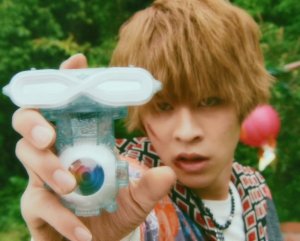
A loving metafilm for Ishinomori's toku staples, strongly recommended, a blast.
*pulled from my LB review, vague spoilers*The Matrix, Evangelion, and now Kamen Rider (and Sentai), was 2021 the year of the major metatext movies or something?
A pretty rousing anniversary crossover movie, it actively delves into the burden of storytelling in creating conflict and that even the pretence of heroism exists as a response to evil, something that the Decade x W crossover movie was a bit more subtle about, so it is almost familiar territory, but nonetheless, the maximalism here is incredibly captivating in its own way.
One of Rider’s newest protagonists literally having a conversation with the—fictitious recreation of—Rider & Sentai’s original writer, questioning the value of stories of conflict and the idea of subjecting characters to harm as a haunting act of creation before arguing its necessity in dealing with the inevitable good and bad inherent to reality and humans themselves and not fully retreating into escapism.
While the lens of Toei as a pretty major company making some incarnation of a dead figure having a dialogue with a new character from a franchise he spawned but who he didn’t directly create while the new character argues for the continued existence of heroes almost seems dubious, you can’t help but feel the earnest sincerity and accepting the bittersweet declarations at the end as heartfelt and truthful, it works quite well.
There are maybe some complaints to be had in how it feels like more of a Rider movie than a balanced one with Sentai, and some of the early parts feel like fluff with so-so cameos, the film is really carried by its pure spirit and spectacle. Just when I thought Heisei Forever was jaw-dropping in how over the top and fun it is, the back half of this film cranks it up even further, just astounding.
With concerns to Touma being the representative for this big meta story, it makes sense since the motif of Saber is stories after all, and I think I’d consider him more of the proper 50th anniversary Rider since the bulk of Saber fell on 2021 as opposed to Revice STARTING in 2021, so it was pretty contextually appropriate even though Touma may not be the most popular Rider (I think he’s solid at least), and just as Saber’s own TV ending was the affecting and grand finale about the power of storytelling, so too is this a similar complement to that.
Just an absolute blast, tender and exciting; I think Touma’s reconciling with trying to return to reality happens a bit too suddenly including the hardship he feels in parting from Luna, but the notes are still there broadly, and you could hardly ask for a more loving tribute to the 2 major franchises here (even if Sentai is a bit skewed against Rider, though Rider has the bigger anniversary here after all).
One of the best Rider movies, highly recommended.
P.S. This movie also gets bonus points for making Reika more serious again, cutting her brocon crap, as well as downplaying Den-O’s role in the back half mercifully (and I say that as someone who likes Den-O but think it’s way oversaturated), even if they do have a part in the front half to a degree.
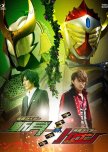
Not quite up to Gaim's high bar but not bad. Zangetsu good, Baron a bit odd.
*pulled from my LB review*Bit of an oddity.
The Zangetsu half is a truncated but still good little supplement to contribute more to showing Taketora’s soft side in a small but tragic little tale about a bond he shared with his family servant ruined by the malicious side of the Yggdrasil foundation and a sins of the father kind of deal, while Taketora still tries to remain loyal to his beliefs in an ends justifies the means method. Taketora walks a similar path to his father with the corporation and everything, but knowing all the bad things he has to do for a greater peace so he believes, showing his true kindness but lamenting his actions for his goal. It’s a nice reaffirmation through both him and even Micchy a bit to show how they are sacrificing their own connections and self-respect for something bigger, as he probes his little brother about if he too could find it in himself to betray his friends to do what’s right, something Micchy believes he can do with a heavy heart. It’s more subdued and has a nice gravitas to it that works, even if it could all be more nuanced and expanded if not for the format.
Then you get to Baron’s half.
Basically a repeat of Toshiki Inoue’s tonally jarring doppelgänger episodes of Blade, Kaito runs into a look-a-like who forcibly switches places with him and shenanigans ensue before we learn Shapur, the doppelgänger, is the son of some big businessman who is trying to kill him off since he was illegitimate (?) and not a proper successor to the business. A side story for Kaito sounds very promising since he gets a bit overshadowed and takes a lot of Ls in the main series as things go on, but this story lacks some of the sensitivity of the first half for the central plot - it’s nice that it adds more to Kaito’s backstory about why he always yearns to be strong and ruthless, coming from an abusive childhood and everything, and obviously it shows the parallel with Shapur having his own bad dad figure and Kaito empathizing with him, the former in a way just a kinder, more naive and weaker version of Kaito himself, having come from similar poor parental relationships, but the core story feels awkward and cheap, the corniness doing a bit of disservice to Kaito’s angst and everything; the serious stuff is well-meaning, but it is drawn out by something that undermines it with its silliness, so it leaves a bit to be desired.
Decent little extra content for Gaim’s secondary characters, but both characters should’ve probably had their own dedicated V-Cinema to truly make the best of their extra backstory stuff and enrich their characterization further. Good, but not filling enough.

Not bad, but not nearly as good as Ghost proper (which is great btw!)
*pulled from my LB review*Retains some of Ghost's energy in a quaint story about the world of heroes in some afterlife-esque place where Makoto's dad got stuck at during his research on the Eyecons and all I guess, and Alain's other brother, Argos tries to collect 100 Heroic Eyecons (to the main series' 15 or so) to turn everyone into ghosts for immortality presumably because he failed to get himself revived earlier. Argos' plan is kind of intriguing in that sense, and the family connections with Makoto and Alain here hope to add relevance, but it all feels kinda barebones, needed way more fleshing out.
The pacing is also pretty uneven, and it concludes with some weird plot devices and yet another Takeru death & revival, but it feels especially unbelievable with this movie's inherent pseudo-canon side-story nature, but yet they still try to sell you on Takeru's noble sacrifice and all, even closing on the dramatic reveal of his revival then the credits roll.
Feels like your average Rider movie with the typical shortcomings and all, but I think the criticisms are a bit overblown (given Ghost's pre-existing bad rep among the other entries of the franchise, but is one of my favourites), and again, still has some of Ghost's charisma, sense of fun and all to make it digestible.
It's fine; I was amused.

Inoue's best toku thing in YEARS, a loving tribute to KR old & new.
*pulled from my LB review*Winds up kinda simple, the ponderings on life and Nova Shocker trying to rule the world through economic power as opposed to Shocker with their authoritative, physical power wind up as footnotes than more elaborate philosophy and plotting, but it’s still fun nonetheless.
The idea of the changing face of both good and evil is quaint, and it’s fitting that this movie came in time for one of Heisei’s more self-conscious and doubtful heroes to be the representative of modern struggles (more personal challenges and socio-political anxiety) against the more pure, emblematic ideas of heroism back in Showa (Japan’s post-WWII aspiration for moral atonement, recovery and direction) bouncing off each other.
We see Takeru’s open admission of needing support while sharing his inherent want to protect others challenged by the more self-sufficient and stoic values of Takeshi, the latter asking the former, carrying the torch just what exactly life means and what makes it precious, leading to Takeru charging head first into danger after Takeshi’s initial “loss” even though he and Makoto had continually lost to the villains themselves, but recognize that they had failed to protect a life, but instead of doubting, running away and resigning, they press on in the hopes that they won’t fail again and there will be further losses. Then Takeshi comes back to recognize his own enduring importance in guiding the new generation and lending a helping hand when he had the option to back out of the conflict, his spirit reborn, fighting for peace for as long as he is able before the torch will properly pass anyways.
It’s a nice anniversary film celebrating Rider’s long history, a bit similar broadly to the Decade crossover movie’s idea about Tsukasa/Decade being the Rider born whenever a hero is needed again, but this was more of an homage to 2 different times and all and didn’t feel too redundant anyway.
Nothing major and occasionally a bit choppy, but the action is pretty solid, the character interactions are nice, the pacing is decent and it’s all around pretty amusing and fun, good Sunday afternoon cinema.
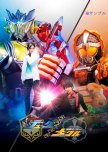
Step down from previous Gaiden, worth a look, but thorny.
*pulled from my LB review*Duke half is fine, more of a shared backstory thing for all the Yggdrasil members individual origins, plot about some former researcher starting a brainwashing terrorist group seemed kind of vague and unmemorable, I think the highlights were really just the early bonding and backstories for the Yggdrasil members and how Ryoma showed his loyalty to Takatora but remained fixated on his own self-serving goals.
Knuckle section is more interesting but kinda complicated.
Don’t remember all the specifics of Gaim too vividly after watching so much Rider and having seen it as only the 2nd Rider series I’d completed, but despite moments even in the previous Gaiden for Baron showing Kaito’s troubled upbringing, he remained fixated on his tyrannical goals to the end of the series iirc (whether that “destroy this world” was figurative or not either I can’t recall) but he was still kind of a bad dude all the same.
This section—coming after the series end—is a nice further denouement for the series (to an extent), showing Team Baron’s side now trying to move forward without their original leader, who again, wanted to sort of conquer everything.
It deals with the formation of Team Baron and how it was a pretty friendly dance group before Kaito overtook the group by force, further showing his bad Machiavellian side, but Zack also trying to wax nostalgic about the group all the same. Kaito forcing his way into (and properly establishing) Team Baron was an event that seemingly created a severance and formed ideological sides in the wake of it, now furthered with Kaito’s death and the legacy he left.
It serves as the crux of the plot where the villain here, Shura, was exiled by Kaito from the group for being cowardly, and is now creating a Neo Baron team to carry Kaito’s philosophy of might makes right in a way. Zack believes Shura’s group is a misrepresentation of Kaito’s beliefs, and tries to end Neo Baron and its violent cult-like ways.
That kind of schism from a key formative event positively recalled Fist of the North Star for me, with some characters who walk different paths of life based on different interpretations of a philosophy or how they wrestle with grief, but again, iirc, Zack was kind of opposed to Kaito’s lust for power by the end of Gaim and tried to stop him, and Kaito was never really a very righteous guy, so seeing how Zack had those peaceful days with the dance crew pre-Kaito and was opposing Kaito towards the end, it seems strange that he would fight for some vague sense of honour for Kaito’s ideals, because if anything, Shura’s Neo Baron kind of emulates Kaito’s lust for strength pretty accurately, and instead of Zack trying to reconcile with the proper idea that Kaito was a bad guy, he just clarifies that Shura was exiled not because he was weak, but because he was a coward, boiling down to something kind of pedantic, and never trying to truly make a case for Kaito as some noble figure, even at the end when he sees a vision of Kaito and is communicating with him, lamenting he never truly understood him and might never do so either.
Again, it could be that this makes more sense if I remembered something more good natured about Kaito’s goals and that Zack might not have truly rejected him at the end, but it makes the actual conflict of interests here a bit muddier and Zack’s intentions harder to get behind, which is unfortunate because I liked how this was setup initially, but it just doesn’t totally click in the end, and closes on a weird, sort of ambiguous note after some of the more optimistic sentiments earlier about trying to build a happy world in the absence of Gaim’s major figures with this and Gaim’s actual ending.
More frustrating and ultimately less essential than the previous double Gaiden, it’s fine but a bit confused and lacking still.
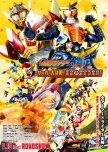
Not as bad as people say, though a farcry from Gaim's heights
*pulled from my LB review*Gaim is my favourite Heisei series, but a few people I follow mentioned this movie was really awful, even for a more low bar for Kamen Rider movies, but I didn't see anything particularly terrible about it.
It's a farcry from Gaim's quality ofc, but this isn't written by 'The Butcher' anyway, so obviously it's just gonna be a little theatrical cash-in and not some exceptional film or anything. The writing is a bit passive and murky at times, not helped by kinda standard direction making it a lull at times, stuff about conflict and a very loose garden of eden story that lacks energy, but it has its moments like Sano showing off his (? pretty sure, unless it was a stunt double) gymnastic skills in that opening soccer game with those wild flips, Baron doing some wild stuff on the motorcycle, another horse riding battle, etc, but most importantly, a nice little scene that reaffirms Kouta's values - that despite so many people around him choosing to fight, seek power and be wicked, some as former friends, he continues to fight on their behalf, to not cave to a misanthropic futility and hold his optimism in trying to fix everything back in his world and all.
The ending feels a bit empty, but on the other hand, you could say it's a bittersweet one thinking about Kouta having to return to his own world after seeing brief glimpses of peace as a dream and all; not immediately effective, but a bit interesting in the larger context and the greater despair Kouta has to face in the series down the line.
Pretty lackluster relative to the Gaim series, but acceptable on its own terms.
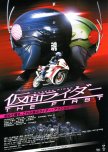
A sleep-inducing bore that is bad both as an Ichigo remake and a film, period.
*pulled from my LB review*I think I’m being awfully generous for this, maybe I’m fixating too much on Inoue’s credit, not wanting to give this a lower score than Kiva, but god, this is so lame.
The storytelling is just completely apathetic - slow pacing, low energy mood, almost no suspense, barely any plot build-up, unfeeling editing, sparse, weak action, every actor looks bored out of their minds, shallow characterization, just totally sleep-inducing.
I wouldn’t be so upset if this wasn’t intended to be a celebration and reimagining of the original Kamen Rider series, because it doesn’t seem like a single person here cares about what they’re doing, like it’s mind-boggling the degree of how passive this thing is, everything just “happens” almost completely drained of any emotional or dramatic inclinations. It just makes it all the more damning when it’s meant as a reimagining the very first Kamen Rider and everything, if it was just some weak original entry doing its own thing, it could just be ignored, but one has to wonder how anyone would possibly think this was an acceptable homage when seeing this.
The biggest thing this movie cares about is talking about WATER CRYSTALS, it’s mentioned repeatedly as seemingly the only thing that matters, not the leads as characters, not Shocker’s background and plan, not the romance, they seem to give the most care to talking about that of all things; it is kind of meant to be symbolic for evolution in life and love within an individual or something, but it’s brought up a lot and seems completely unimportant when every other element of the story here is so lacking.
This movie filled me with a weird aggravation at how something could be so fundamentally disinterested in even “being”, the visceral response I got here felt similar to the sensation I would get from something with a lower score, but yet there’s little that’s noticeably egregious about the writing to legitimately upset me, it was just baffling how boring it was is all, so for the time being I feel like I can go easy on it for not constructing something legitimately stupid like Kiva or anything, and the movie is strangely a bit relaxing with some of the settings, mild tone, aesthetics and all if you try and tune out the stuff that’s actually about Kamen Rider in here, probably best to have it with no subtitles and with some tranquil music playing as you watch, with the movie muted even maybe.
Unfathomably dull, hollow white noise as a Kamen Rider movie, but inoffensive and potentially soothing if you just kinda gloss over the narrative and just watch the visuals, otherwise entirely skippable.

Adequate but inessential Zero-One coda film.
*pulled from my LB review*Honestly, aside from the opening 15 minutes and maybe parts of the last 15, I thought this was kinda dull.
After an initially confusing yet somewhat captivating opener throwing you right into the action and with a countdown framing device to seemingly add some more (artificially created) immediacy to the events, the film instead turns into this low energy, very passive mystery trying to figure out the situation with Es’ sudden appearance and motivations and everything, but none of it feels particularly captivating. Aruto wanders through a virtual consciousness space with some enigmatic woman slowly learning what Es is trying to accomplish on the surface level before trying to recover and get back to fighting Es with a bunch of weird stops and starts, MetsubouJinrai, Isamu and Yua kinda just scramble around trying to do some hacking and research and Gai interrogates one of Es’ subordinates to get some clues, but the action really dies down and the Paradiso group just kinda drifts around for a while.
Everything feels more lax and low stakes than it should be, and Es’ backstory is sympathetic but kinda familiar and unfelt with all this clumsy structural juggling and boring events going on throughout the film, unable to keep tensions high, so it feels pretty inert, especially with how brief and uneventful the ending is. I was hoping with Zero One’s abridged episode count due to COVID, they might try to make up for some of the shortened arcs and cut developments as best they could with these supplementary materials (this very movie even given more time in a double bill Toei hero film mashup than usual (shaving off 10-20 minutes that could’ve been given to the Saber movie to add to this) but it just does more damage to the film by making it feel like more of a drag.
With the Zero One TV series’ frustrating rollercoaster of quality, at least I was pretty captivated with it most of the time, this is just fairly boring, definitely one of the weaker stories to come out of this Kamen Rider iteration imo, but it’s still fine.
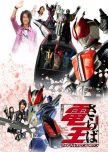
A disappointing send-off for Takeru Satoh in an otherwise merely OK Den-O movie
*pulled from my LB review*Weakest Den-O movie so far perhaps, or at least not as good as the previous, feels very low energy for what was SUPPOSED TO BE Den-O’s last film. The story about letting the past die and moving on with the future is fine on paper, but the storytelling feels kind of emotionally removed - Ryotaro and Sora barely interact, the latter just kinda mentioning she died long ago, kinda saddened by Shiro attempting to reverse life and death for her sake (funny that Kobayashi pretty blatantly recycled the Ryuki villain’s name and motivation here lmao), while Ryotaro just hears out her super minimal story, barely tries to actively break through to her, little in the way of gravitas to anything.
Even the whole dilemma of Ryotaro being possessed by the villainous Imagin is undone just by willpower eventually and a not-so-suspenseful fatal injury to Momo which leads to a quick turnaround, just kinda whatever. The historical stuff is very tepid flavouring, plot details seem kind of lost, everything just boiled down to moving things along for indistinct structural beats. Even the focus on either lead character, Ryotaro or Kotaro gets kind of put off to the side, while the 2 characters themselves get little time to interact until mostly just at the end, a lot of it is just the Taros driving everything forward, quite a shame that Takeru Satoh as Ryotaro’s final major Den-O role is mostly eclipsed by the Taros, who have basically become the real Kamen Rider Den-O themselves (mainly Momo ofc). Ryo and Ko’s few moments to shine are nice I guess, and having each Taro form in that big lineup brawl was kinda nice, but this movie’s highlights are kind of fleeting.
A mild disappointment as Ryotaro’s farewell and a weak Den-O story, but it’s passable I suppose.
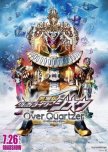
A few nice complementary Zi-O details, but mostly whatever.
*pulled from my LB review*Wonky structure with a both overlong and kind of truncated (or at least, kinda boring) initial objective, feels like a casual, extended Zi-O episode than a movie in the first part, and then the main conflict becomes apparent about 1/3 of the way through for a pretty fun and over the top excessive Heisei tribute.
That said, it feels especially jarring how incongruous that first third kinda feels with how slack it is and having Go being the only real legacy Rider we see outside of the suit in this one, it’s meant to explain how Sougo properly got the Drive watch when it is kinda glossed over in-series until the actual tribute comes after Sougo gets Grand Zi-O form and all, feels awkward trying to have that portion and only Go there really before he gets kinda overshadowed later on.
Some of the information about the evil alternate Sougo and such further validates Geiz and Tsukuyomi’s passivity with trying to kill Sougo and instead befriending him and all, meanwhile Woz makes a big betrayal before he starts to reassess and reflect on his values and all, as does Sougo with remembering why he desired to—and believed himself to be—a king, nice reaffirmation there.
The big Heisei Rider battle is what it’s all about though, and it’s a lot of fun, the style in this film is pretty enthralling even if it’s just a sort of maximalist spectacle compared to the precise ebb and flow of a Kamihoriuchi directed film.
Has some awkward parts that hold it back from pure unfiltered joy, but still a mostly another fun mass tribute and send off for Heisei.
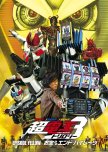
Yonemura delivers the best of Den-O again and ends it on a high note.
*pulled from my LB review*Genuinely impressive that in spite of featuring one of my most hated Riders, this wound up being the best piece of Den-O side content.
I was a bit wary because Shoji Yonemura would be taking the writing credit over head Den-O writer Yasuko Kobayashi and apparently most of his credits outside of stuff that is originally his own is not good (most of the Movie War stuff I hear sucks). Then again, his few episodes of Den-O were ironically the funniest of the entire series, so I could've had some better expectations running off that precedent, but Daiki as the star of this one was still a big red flag. Meanwhile this winds up being one of the most energetic and THE most structurally sound of Den-O side content, with Daiki's enigmatic qualities, the cat and mouse dynamic with him and Reiji and all the twists and turns greatly propelling the narrative.
Daiki is a character who SOMETIMES, KIND OF does the right thing in a very antagonistic, roundabout, tsundere way, but a lot of times, it is usually a passive, complementary result of him selfishly going after what he wants, or just never dropping his tsundere, uncooperative schtick ever while being a bit well-intentioned, but it is typically that wall to him which never comes down which makes him so annoying. In this story, it does play up to Daiki's qualities bit by bit, suggesting he would literally kill himself to protect one of his treasures that he managed to steal but got damaged and would rather he not have the treasure at all by killing himself than to take it at less than perfect condition (or so he claims) and it still feels perfectly in-line with his ridiculous character, but also winds up being a perfect red herring to the story.
The major reveal while again circumstantially excusing his bullshit also thematically distills the major character motivations and inner conflicts of himself and Reiji with how things pan out and what those images represent, and leads to a genuinely touching shift in the story, it is done remarkably well.
Where Kobayashi's more "transparent storytelling efforts" (to phrase it somehow) in her Den-O films feel like they are motivated to get to a certain point of conventionally be driven by your usual heroes to some more black and white end point but results in a lethargic feeling of inevitability and indifference, here, Yonemura filters the story through an actively cryptic and suspect protagonist constantly clashing with a perhaps more morally earnest antagonist (even if their practices give grey areas) where the lead character's role is in part meant to deceive and annoy you, but ironically, it results in a big rug pull that is so much more narratively and emotionally coherent and powerful than Kobayashi's more direct efforts (even though Chapter Blue is confusing, it still feels like it is working towards a clear moral rather than feeling like a shitpost and then becoming a dramatic story as this does).
Genuinely solid, has me wondering if Den-O could've been better if it was Yonemura's story all along with how much potential this shows in spite of starring an irksome protag; strange way to end off the trilogy, but surprisingly good!
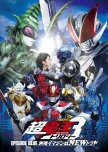
Kobayashi ends her Den-O tenure on a pretty disappointing note.
*taken from my LB review*Takes a good 43 minutes out of this 70ish minute film to justify itself, with such empty, indifferent plotting, but when the reveal happens, it's a pretty emotionally heavy one that starts to bring things into focus and elucidate the parallels between Ko & Teddy and Miku & her grandma.
It's a well-meaning sentiment of fighting to preserve those you cherish and not be complacent to some supposed rules/fate, though there's a lot of hanging details that don't make it as effective as it should be.
For Miku, her motives are rooted in the grief and regret of her future self where her grandma passes away and uses time travel to be able to find an excuse to enjoy the company of her grandma after not making time for her before, but it doesn't seem like the present Miku actually realizes her mistake and grows and instead it's future Miku who got to make the mistake and then go back and use her time again as a second chance while exploiting an Imagin's powers in the process to do so, feels like a morbid "have your cake (spend time with her bf) and eat it too (experiencing her birthday multiple times with different decisions)". It's not like real people have that luxury of being able to explore every option and just undo their regret, seems insincere that she's just able to *fix* it while present Miku was probably able to run off with her boyfriend too for her birthday (?)
For Ko, it's more complicated.
1): He's a character who we've only kind of learned about as a peripheral character across like, 3 movies, so he and Teddy still feel too vague to really get invested in as characters.
2): Kotaro seems to be the one taking Teddy for granted while just casually taking in all of Teddy's assistance like he's just some kind of butler for him, yet Ko takes less of the risk with regards to his contract with Teddy. Sure, he goes out to fight the villain Imagin since Ryotaro is incapacitated so he runs that risk, but the Imagin hardly seems that threatening, and maybe the other good Imagins there could've all pitched in to defeat the baddie (Sieg's inclusion here is pointless and is played off like a lame joke). Teddy meanwhile, runs the risk of permanently being erased by breaking his new contract with the Owner, so him going out of his way to assist Ko has more stakes than Ko trying to take Teddy back by force, even though Ko & Miku taking things for granted is the point.
3): The Owner's contract term just to teach Ko a lesson still feels so arbitrary, while Teddy's apparent revival might in fact only have happened because of his strong connection for Ko, but putting Teddy's existence maybe at risk for some corny lesson under the contract pretense of...helping him buy big spoons (?) is just so odd, this movie has some really bizarre stakes.
Kobayashi ends her Den-O run with one of its strangest, weaker efforts, but maybe just a notch above Onigashima Warship. Disappointing to see all this mostly whatever extra material for Den-O that don't feel especially necessary, even as a fan of the core series.
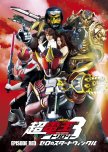
Wasted potential for a Yuto epilogue, temper your expectations.
*copied from my LB review*Yuto's somewhat convoluted but nonetheless tender and tragic story thread from Den-O was always one of its stronger qualities - of a young man from the past heading to the present to stop abnormalities and save his future with the woman he loves. The Den-O series proper ends with a melancholic yet somewhat open finale of Yuto moving on to await his potential future with Airi while leaving the present (iirc). It was a story ripe for a more conclusive affirmation of their love to blossom in a way, and so knowing of this coda series of Den-O films and hoping for a more focused, involved send off for Yuto, I was very much looking forward to this story.
Sadly, this doesn't totally deliver.
On paper, it starts off promising: Yuto contrives a way to be able to look like a hero in front of Airi and find an excuse to be able to encounter her again, but afterwards when they go to talk, Airi tells him that the Sakurai from the future that she fell in love with is now erased, as a fate which isn't set in stone, and that the (Yuto) Sakurai of Airi's affections was an altruistic, self-sacrificing person, who gave up his existence to protect her, but he exists now as a bygone memory (a fated future becoming a discarded past). She remarks to current Yuto that his fixation on Airi and their destiny is bound in that past fate, and now that it is no longer inevitable, and Airi's understanding of the future Yuto is now gone, she believes current Yuto can't live up to that standard, and that he should move on from her.
It suggests a major dialogue of star-crossed lovers being afforded other choices, open to a myriad of other, potentially better possibilities, and an emotionally investing story of Yuto wanting to still try and believe his love for Airi is true and that she will reciprocate him again, a sort of aching existential romance with a lot of potential.
Instead we get a few passing comments from Airi, followed by a bunch of drawn out, hollow silences with angsty gestures and maudlin soundtrack accompaniment, thinking the initial basis of romantic conflict alone with a lot of posturing looks of longing and sadness at nothing is enough to sustain it when a much more rigorous dialogue and focus on these 2 would be required to really make it work.
And thus, we get a lot of the usual Den-O antics, still focusing too much on Ryotaro and the Taros, and it seems especially weird that Airi probably at some point just passively accepted that the younger version of Ryotaro is just *a thing* now, and he and the Taros just get up to a bunch of directionless stuff about trying to find out why the DenLiner is acting up and stuck within one month bouncing around or whatever and some villain conspiring to kidnap Airi and everything. There's nothing wrong with having those guys there, they are more of the main characters after all, and the more typically Den-O plot shenanigans would necessitate their involvement more anyways, but they just take up way too much of the focus with their schtick and undermining the pathos inherent to the real story here. It was a bit of a strange juxtaposition of tones in the series, but that had the luxury of being a 49 episode TV series able to juggle a bunch of different beats and tonalities, here, it is really intrusive.
Yuto should be the main character of this film, but he feels cursory to Ryotaro and the gang, as he doesn't even directly defeat the villain of this film, they do. He just saves Airi from being kidnapped in some van and then goes to look at the stars and drives off with her while she tenderly puts her arms around Yuto as he drives and he puts his hand on hers, meant to count as a romantic resolution. Even Ura remarks that love requires more than just the heroic savior gesture to blossom, to which the film's idea of "more" to fulfill that is just those small things aforementioned.
And what of the villain of the film? Even just a proper antagonist for a potential love triangle to wedge between Airi and Yuto to drive the conflict, not even strictly malicious, maybe someone who is some charming lover that Yuto has to compete with? No, instead we get some homeless guy who just saw Airi pass by him once and then made a contract with an Imagin to be able to just whisk her off her feet by having the Imagin threaten to attack and kidnap her, meant to parallel Yuto's first act of course, but more dubious is all. While that parallel could further illustrate Yuto's own failings and how he has to change, again, the ending provides little of substance for a meaningful growth in him and a real, thorough dialogue with Airi, in its own way it contrives an ACTUAL new threat for Yuto to literally just swoop in and be the hero and that being almost the end of it, it is incredibly cheap and shallow.
Again, one of Den-O has some strange qualities which are offset by the fun, energetic vibes, eclectic cast and how it is able to juggle and flesh out so much because of its length as a TV series, and Den-O has never had good major villains really, but in more limited formats like individual films, they have to be more focused and emphasized, a good villain really enriches the drama to make stories more interesting after all, but here, Yuto's sad sidestory is now (meant to be) the core throughline which is expressly threatened by the central villain of the piece, but the villain is a pathetic nothing, so that just makes the drama here flounder more, it doesn't really work.
This gets by on Den-O's pre-existing charms like most good Rider series keep their supplementary material afloat in a similar vein, but this is a massive disappointment and continues to prove how frustratingly inessential extra Den-O content is more and more over time. Kobayashi has one more Den-O movie after this to maybe prove otherwise (plus the Yellow film not written by her) but so far everything Den-O related after Climax Deka has continued to be a letdown.
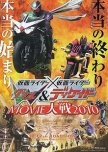
Essential viewing for Decade & W watchers
*pulled from my LB review*A solid extended episode for W mixed with a proper conclusion for Decade that actually hones in on the series' raison d'etre, quite good!
The W portion shows us how everything started with Shotaro's mentor, getting the W belt, meeting Phillip and all, Akiko learning of her father's passing and Shotaro's renewed resolve to grow and become a great detective for the city. Fills in some key details the series didn't address thankfully, wasn't totally substantial in itself, but still an important supplement for W.
The Decade conclusion meanwhile provides a proper outlet for Tsukasa's brazen behaviour, though it would've helped if he properly arrived at this personality if he had a proper arc in the actual series that warranted his general standoffish attitude as more of a gradual thing rather than constantly being an outright jackass.
Nonetheless, the direction and context subtly channels his angst with a nihilist bend for him in a kill or be killed scenario where his fate and very existence threatens everyone else's worlds and he just wants to find a world to belong but now must kill everyone else so he can save himself.
Despite killing other Riders, the overwhelming number of people against him, his precise, chaotic counter-offensives and general demeanour show his desperation to live and bemoaning the situation he's in. With his sacrifice to Natsumi as the atonement for his murder in self-defence, he closes this first age of Kamen Riders (in Decade) with him, but his death bringing the subsequent rebirth of them and all their worlds, and it is then that the characters try to do the same for Tsubasa through their memories of how he affected their lives.
Thus, we hone in on Tsukasa & Decade's purpose: his life had meaning to those around him, and Kamen Riders, or the very idea of heroism, is borne through the tragedy and inspiration values of others in cycles. Tsukasa came to other worlds to fix them, needed to die at the end because there was no more "purpose" to his involvement anymore, no villains out in the open to defeat and all, then the evils leaked out in the chaos, but the memories Tsukasa made along the way bridging the gaps and anomalies in peoples' lives together, existing in the threshold as an adhesive then called for again.
It speaks to Rider's longevity in a way that reminded me of an optimistic Quantum of Solace - that the world will always need heroes and these positive values pass from generation to generation; the series' point perhaps a bit of a silly meta gesture that takes away from its more specific, individual value, but through this movie it became a decent homage to the franchise at least, almost wish this movie could function without the series given how it does all the heavy lifting for it, but at least it gave weight to the very idea of the journey.
Good combo feature, filled in W's hanging details and made Decade not completely pointless, nice.
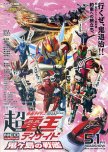
Worst Den-O movie, messy and mostly unnecessary but passable.
*pulled from my LB review*Whew, this movie is…a lot. Way too many characters, concepts, side threads, tonalities, just the whole works, I don’t know where to begin; such a mess, worst Den-O movie so far, but still fine in its own right I guess.
The story starts out with this slower, more earnest and serious story about a boy named Yu mulling about how he hates living in the country after moving to the city, the reasons for which are touched on passively and in few fleeting details instead of drawing on more of the affecting potential it could have. Yu starts out kind of annoying with his shallow complaints at first (which, would seem less so if they better foregrounded his backstory which makes his angst a lot more warranted) and kind of unhelpful for a bit, taking his time before coming around to helping the Den-Liner crew, but he does come around and the heroes start to assemble and roll forward a bit more.
Part of the problem though is that this movie never really settles into a clear defining motivation and progression enacted by some clear “main character” hero with real presence and/or a more urgent conflict to captivate you to it. Yu is just a civilian along for the ride, not-Ryotaro (more casting conflicts explained with further time shenanigans a la Hana & Kohana) doesn’t have Takeru Satoh’s charm or older age & “star power” look on top of playing a passive part in the story still, Kotaro is still kinda subservient to Ryotaro and the others, Tsukasa and the other Decade characters only have a few minutes to drop in and out, and the Taros feel like they are along for the ride. It feels like some weird, flimsy, overly bloated collective just kinda steering the plot into getting everywhere it needs to go.
And even the plot isn’t that interesting, it’s a lot of just drawn out setup simply to assemble the team before they stop the villains who are these lame demon brothers who wound up being separated by time and are trying to reunite so they can make some battleship and control all of time with some magatama object or some shit? Idk, they’re pretty worthless, and Den-O isn’t known for often having convincing villains, but it especially sucks when you’re looking for SOMETHING to stand out in the film and they feel just as lousy on top of everything else.
What else…the fight scenes all feel so slapped on and boring, made worse by using these goofy slapstick jazz tracks during scenes meant to be more suspenseful as the drama mounts, said drama is undermined by weird pivots into heavy comedy suddenly despite being fairly tame on its comedy beforehand (that fakeout switch plan was just really awkward in timing and all), the Decade stuff is almost totally arbitrary (the movie could’ve maybe used Tsukasa as a proper driving lead but he only makes a few brief interjections too, and while less of the paired series was a mercy with Kiva for Climax Deka, here, it is probably needed) but of course Daiki has to show up for all of like, virtually a minute total screen time and prove why he’s one of the worst Rider characters by throwing a wrench in things for no reason to draw out the final battle more, the subplot with Toki (tying in with Yu’s stuff) doesn’t feel as prominent as it should be and gets relegated to the background until the end really (but that storyline providing one of the few bright spots to the film ultimately), it’s just…too much.
If it weren’t for some of the stuff with Yu and Toki (the twist involving that as well is kinda cute and the film I think is able to hide it from being more obvious by bogging the rest of it down in so much other crap) I would rate this lower, definitely one of the weakest KR movies I’ve seen, but that part on paper is still well-meaning and tender enough that I can respect it. Hoping the more lasting impact, stripped back and focused Super Den-O trilogy movies can fare better, but this was a bit rough, only charming enough.

